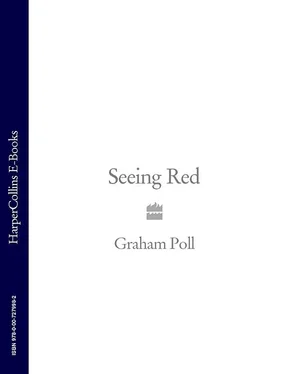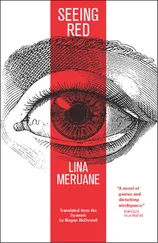Not long after that, Derby’s Stephen Pearson scored the game’s only goal and provoked a really tense finish as West Brom pressed for an equalizer and Derby defended the lead which would carry them into the Premiership. In the dying moments, the tension exploded, and players from both sides squared up in a mêlée, but I was able to defuse the situation by getting in among the players, staying calm, pulling the instigator out and using some of the body language and people-management I had learned over the years.
I had intended to be in the centre-circle when I blew the whistle for full time, and I wanted the ball to be near me, so that I could grab it for a souvenir. I had thought about doing a dramatic, European-style signal as I whistled at the finish – putting both hands into the air, then moving them parallel to the ground and then putting them down by my side. But, when the moment actually came I was too engrossed in the action and too tired to do all that stuff. I was in the Derby area and I just put my two arms in the air and gave a peep on my ‘Tornado’ whistle to end the game and finish my professional career.
I felt drained. I think the mental pressure of the previous few months had taken its toll – the strain of knowing for so long that my career was finishing and the anxiety of hoping it would end well. After all, my life as a professional ref could have concluded very differently and far less satisfyingly. I might not have reached 100 international games. I might not have refereed the Play-off Final. Or I might have had a major controversy at Wembley. But it had all gone as well as I could possibly have hoped – with a terrific European match in Seville, an epic Play-off semi-final at Nottingham Forest and a farewell at Wembley. As I relaxed, I was engulfed by the overwhelming fatigue which comes when stress ends.
In Play-off Finals, wrongly in my view, the losing team does not go up to the Royal Box for any sort of presentation. Neither do the match officials. So we stood about in the middle watching Derby players climb the steps to receive their trophy and medals. I shook hands with the assistants and with Jim Ashworth. Deano and I hugged each other and then, after a very short while, I said, ‘Come on, let’s go.’ It was over.
CHAPTER EIGHT
That is how it ended for ‘Referee G Poll (Herts)’ but there were so many good days and good stories. I want to tell you about the altercation in the tunnel between Roy Keane and Patrick Vieira and some of the tales from fourteen years as a Premiership ref. And I want to take you behind the scenes of my life as a referee and explain how I learned to deal with being ‘The Thing from Tring’, the wanker in the black, that ref everyone thought was arrogant.
So I have to start, briefly, with my parents. I have to start with my dad. He was a ref, so it is him I have to thank (or blame). I also have to start with my mum, who drove me to all my early games and stood, huddled in the cold and rain, watching me referee before taking me home again.
Throughout my career in refereeing, people asked me why I did it. I answered, ‘Why wouldn’t I?’ I am a football fan and I have been closer to the action in big games than anyone other than the players. I travelled the world to see truly superb players – Zinedine Zidane, David Beckham, Andriy Shevchenko, Cristiano Ronaldo – in superb stadiums. I rose to the daunting physical and intimidating mental challenges of refereeing. In fact, I relished those challenges.
But it didn’t start like that. It didn’t start like that for my dad, either. For him, like a lot of referees I suspect, it began as a way to earn a few more quid. He needed the money for us, his family, which I was the last to join.
I was born in 1963. It was the year Martin Luther King delivered his ‘I have a dream’ speech, Bobby Moore became England captain, the Beatles released their first album and London was swinging. But in Hertfordshire, my mum and dad had more mundane concerns when I arrived in the world. I was born in the Hitchin maternity hospital but lived throughout my childhood and adolescence in Stevenage, an old market town which became the first of the ‘new towns’ – developments which were deliberately and dramatically expanded to re-house people after the Second World War.
Mum and Dad did their bit to aid Britain’s recovery from the ravages of war as well – by contributing to the baby boom. They married in 1957, moved to Stevenage that year and started their family fairly quickly. Susan arrived in 1958, Deborah in 1960, Mary in ’61 and me in ’63 – just after Dad had got rid of a train set which is famous in our family.
The story is that he bought a toy train set when Mum was pregnant with Susan, in case the baby was a boy. He kept this train set, unused in its box, for years while Deborah and Mary came along. Then, when Mum was pregnant with me, he assumed the baby would be another daughter, so he got rid of the train set – just before little Graham arrived. If you put that story alongside the fact that Mum and Dad were both football mad, and that I had a career in football which they have enjoyed sharing, you can understand why, sometimes, my sisters felt a little vexed about little Graham – well, not about me as such but about all the time Mum and Dad spent with me at football.
The Poll family moved when I was one year old. We moved a short distance, in the same Stevenage neighbourhood of Shephall, but the new home – a four-bedroomed, terraced house – had more space. There were five houses in the terrace and ours was the second from the right. As I grew older, I made friends with boys in the terrace and across the street, and a crowd of us used to spend all our spare time ‘over Ridlins’ – at Ridlins Wood Athletics Track and Playing Fields, just behind the houses opposite our house. As well as the athletics track, there were swings and slides and five football pitches. We played football there from dawn to dusk.
If that all sounds mundane, I make no apologies. I realize that some autobiographies start with terrible tales of depravation or horrific accounts of childhood abuse. My story began with loving, hard-working parents in a normal home, but I am sure a shrewd sociologist would spot, in the child I was, clues about the man (and referee) I became.
For instance, why was I picked for the leading role of Fat King Melon in my primary school play? No, it was not because I looked like a melon. In those days I was as thin as a stick and my hair was so fair it was white. I was reminded about being Fat King Melon by one of the supportive letters I received when I returned home from the 2006 World Cup. Peter Browning, who taught me at primary school, wrote it and recalled that I had been in that school play.
I loved amateur dramatics. I suppose that sociologist would nod knowingly at that statement. My critics in the media, who have accused me of enjoying the limelight of publicity, would smile at the admission that I enjoyed being in front of the stage lighting. But my own analysis is that I liked acting because it was a way of dealing with an inner insecurity.
If I was told, as a schoolboy, to go to such-and-such a room, I would want to loiter outside, dithering about whether it was the right room and what people would think about me when I went in. So, to deal with that feeling, I would confront it. I would burst into the room and be completely over-the-top. I used to overcompensate.
Decades later, when I first reached the Football League referees’ list and started going for medical checks, my blood pressure was always very high. That was anxiety – not about passing the fitness assessment, but about meeting people and about what those people would think of me.
So, at my schools in Stevenage – Ashtree Infants and Primary and then Thomas Alleynes – I overcompensated. I was the class joker and took to the stage. My first role at senior school was as a little girl in HMS Pinafore . I don’t want the sociologist to even think about that. We also did old-time musicals, which I loved, especially when the local girls’ school joined us for productions when I reached the fourth form (now known as Year Ten). I was one of the chaps who used to enter from one side of the stage to do ‘I say, I say, I say’ jokes.
Читать дальше












